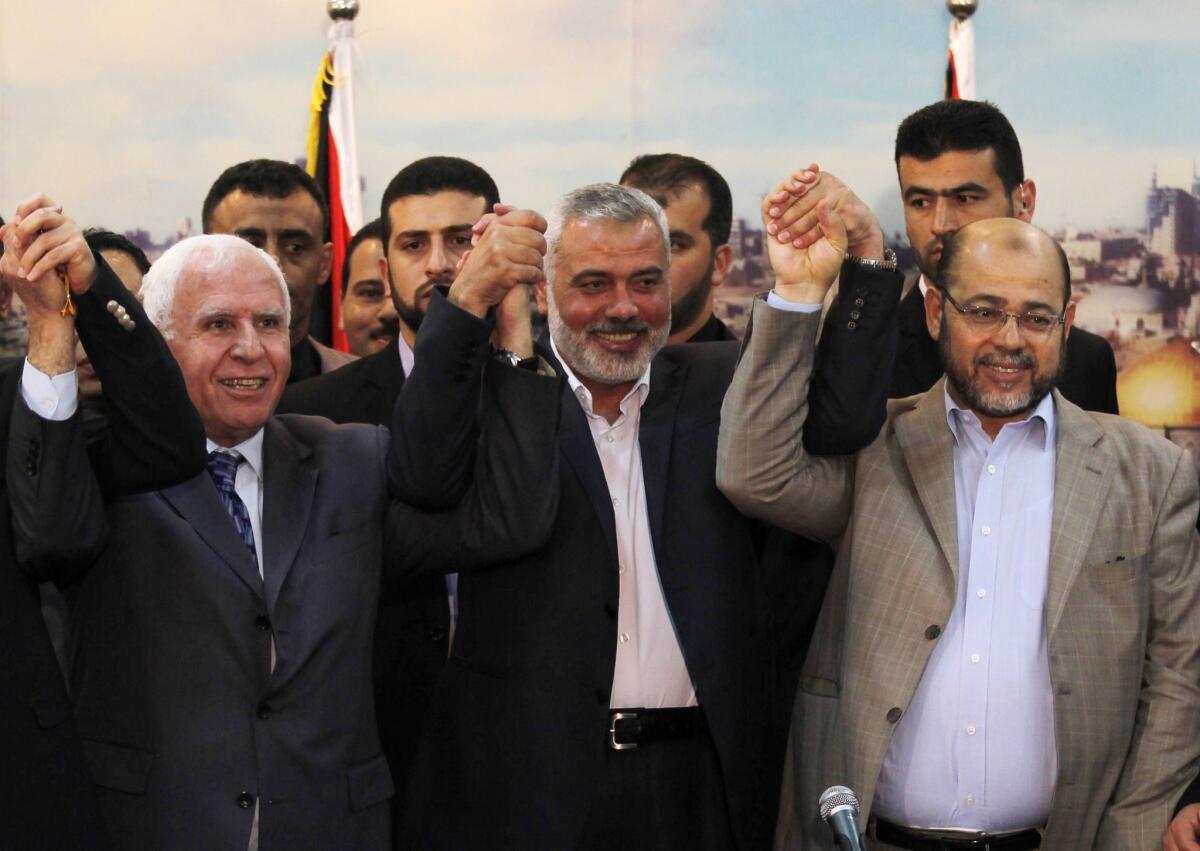Israel suspends peace talks with Palestinians over unity deal

JERUSALEM -- Israel is suspending its involvement in peace talks and planning a series of sanctions against the Palestinians, Prime Minister Benjamin Netanyahu’s office announced Thursday.
The decision, after a six-hour Israeli Cabinet meeting, followed Wednesday’s announcement of a reconciliation agreement between the two leading Palestinian factions, which will bring the militant Islamist movement Hamas into a new Palestinian government within weeks.
“The government of Israel will not negotiate with a Palestinian government that relies on Hamas,” the statement said, noting the Cabinet decision was unanimous.
Instead of choosing peace with Israel, Palestinian President Mahmoud Abbas made “a pact with a murderous terror organization that calls for Israel’s destruction,” Netanyahu said, adding that Israel would not hold talks with the Palestinians as long as the unity initiative continues.
The sanctions to come include a previously announced Israeli plan to deduct Palestinian debts to Israeli companies from the tax revenues Israel collects for the frequently cash-strapped Palestinian Authority.
The reconciliation agreement was the latest in a long chain of events that had already threatened the 9-month-old peace process, which was largely driven by Secretary of State John F. Kerry and had repeatedly brought him to the region. Even before Israel’s announcement, prospects were slim for extending talks beyond their deadline, which was a week away.
Hamas, which rules the Gaza Strip, and Fatah, which dominates the Palestinian Authority in the West Bank, agreed Wednesday to end their seven-year schism and form a new Palestinian government made of independents and technocrats by June. Under the deal, election for parliament and the presidency will be held next year.
Abbas intends to issue presidential orders for implementing the agreement in coming weeks, according to media reports.
Making the unity accord a reality won’t be easy. The two main Palestinian factions remain deeply divided on key issues, first and foremost the diplomatic process with Israel. Agreements reached in the past eventually fell apart.
Israel rejects Hamas as a terror organization. The U.S. and Europe hold similar positions.
Netanyahu slammed Abbas for turning down U.S. initiatives, refusing to recognize Israel as the national homeland of the Jews and unilateral moves violating agreements.
Numerous Palestinian officials from Fatah emphasized throughout the day that Palestinian unity does not negate negotiations with Israel. Abbas said there was no contradiction between Palestinian reconciliation and negotiations with Israel.
Moreover, he said, reconciliation was needed to strengthen any agreement reached with Israel in the future.
“The two-state solution is the only game in town,” Palestinian politician Jibril Rajub told Israeli media, calling both Israel’s government as well as Palestinian factions to support Abbas’ policies.
Hamas comments reflected ambiguity. Ghazi Hamad of the Hamas government in Gaza told Israeli media that Hamas has said it would accept a Palestinian state within the 1967 borders but would not recognize Israel.
Others emphasized that Hamas would not accept conditions called for by the international community in the past, including renouncing violence and accepting all previously signed agreements between Israel and the Palestinian Authority.
According to hawks among Israeli ministers, there is little difference between Fatah and Hamas anyway.
“Hamas wages classic terror ... Abu Mazen wages diplomatic terror,” Foreign Minister Avigdor Lieberman said, referring to Abbas by a nickname. Tourism Minister Uzi Landau was more blunt, saying it was “like the difference between Jack the Ripper and the Boston Strangler.”
Sobelman is a special correspondent.
More to Read
Start your day right
Sign up for Essential California for news, features and recommendations from the L.A. Times and beyond in your inbox six days a week.
You may occasionally receive promotional content from the Los Angeles Times.






